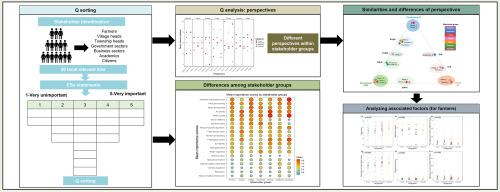Stakeholder perspectives on ecosystem services in agricultural landscapes: A case study in the North China Plain
IF 6.1
1区 农林科学
Q1 AGRICULTURE, MULTIDISCIPLINARY
引用次数: 0
Abstract
CONTEXT
Intensive agriculture is under pressure from changing demands from society, prompting the need to redesign agricultural landscapes to provide multiple ecosystem services (ESs). However, implementation of changed practices requires positive engagement from stakeholders. Therefore, their perspective on ecosystem services needs to be known.
OBJECTIVE
This study investigates stakeholders' perspectives on multiple ESs in Quzhou County, an area in the North China Plain used for intensified cereal production. We aim to elucidate perspectives within and across diverse stakeholder groups (farmers, companies, citizens, academics, village and township heads, and county government staff).
METHODS
Employing the Q methodology, we identified differences in perspectives within stakeholder groups and we compared the similarities and differences of those perspectives across stakeholder groups. We also investigated how farmers' personal and household characteristics were related to the perspectives they held.
RESULTS AND CONCLUSIONS
Significant differences in preference emerged among stakeholder groups. Academics assigned higher importance to regulating and supporting services than other stakeholder groups and companies assigned less importance to cultural services. We identified 18 distinct perspectives across seven stakeholder groups. These perspectives showed a combination of preferences for at least two different ES categories. Most of the perspectives prioritize provisioning services whereas only few perspectives prioritize supporting services.
SIGNIFICANCE
This study exemplifies a bottom-up approach for systematically analyzing stakeholder perspectives on the relative importance of ESs derived from agricultural landscapes. The revealed differences and complexity of stakeholder perspectives can inform decision-making on the redesign of agricultural landscapes with stakeholder engagement. Recognizing areas of consensus and conflict can guide efforts to promote agroecologically sound practices and policies.

农业景观生态系统服务的利益相关者视角——以华北平原为例
集约化农业面临着不断变化的社会需求的压力,促使需要重新设计农业景观,以提供多种生态系统服务(ESs)。然而,变更实践的实施需要利益相关者的积极参与。因此,需要了解他们对生态系统服务的看法。目的探讨中国北方平原谷物集约化生产地区衢州市多家企业的利益相关者观点。我们的目标是阐明不同利益相关者群体(农民、公司、公民、学者、村长和乡镇负责人以及县政府工作人员)内部和之间的观点。方法采用Q方法,我们确定了利益相关者群体内部观点的差异,并比较了利益相关者群体之间这些观点的异同。我们还调查了农民的个人和家庭特征如何与他们持有的观点相关。结果与结论利益相关者群体的偏好存在显著差异。学术界对规范和支持服务的重视程度高于其他利益相关者群体,而公司对文化服务的重视程度则较低。我们在7个利益相关者群体中确定了18个不同的观点。这些观点显示了对至少两种不同ES类别的偏好组合。大多数透视图优先考虑供应服务,而只有少数透视图优先考虑支持服务。本研究举例说明了一种自下而上的方法,系统地分析了利益相关者对农业景观中生态环境相对重要性的看法。所揭示的利益相关者视角的差异和复杂性可以为利益相关者参与农业景观重新设计的决策提供信息。认识到存在共识和冲突的领域可以指导促进无害生态农业的做法和政策的努力。
本文章由计算机程序翻译,如有差异,请以英文原文为准。
求助全文
约1分钟内获得全文
求助全文
来源期刊

Agricultural Systems
农林科学-农业综合
CiteScore
13.30
自引率
7.60%
发文量
174
审稿时长
30 days
期刊介绍:
Agricultural Systems is an international journal that deals with interactions - among the components of agricultural systems, among hierarchical levels of agricultural systems, between agricultural and other land use systems, and between agricultural systems and their natural, social and economic environments.
The scope includes the development and application of systems analysis methodologies in the following areas:
Systems approaches in the sustainable intensification of agriculture; pathways for sustainable intensification; crop-livestock integration; farm-level resource allocation; quantification of benefits and trade-offs at farm to landscape levels; integrative, participatory and dynamic modelling approaches for qualitative and quantitative assessments of agricultural systems and decision making;
The interactions between agricultural and non-agricultural landscapes; the multiple services of agricultural systems; food security and the environment;
Global change and adaptation science; transformational adaptations as driven by changes in climate, policy, values and attitudes influencing the design of farming systems;
Development and application of farming systems design tools and methods for impact, scenario and case study analysis; managing the complexities of dynamic agricultural systems; innovation systems and multi stakeholder arrangements that support or promote change and (or) inform policy decisions.
 求助内容:
求助内容: 应助结果提醒方式:
应助结果提醒方式:


